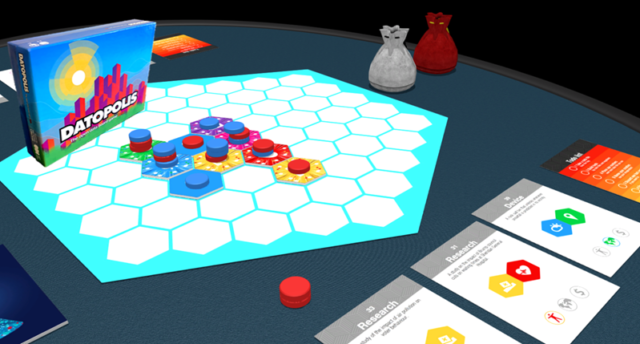Moving Datopolis online
23rd Arpil 2020
Post by: David Tarrant, Senior Learning Advisor @ ODI
It's been a while. Sorry about that.
Cutting a long story short, things have changed a lot in the last 5 years.
- Ellen left the Open Data Institute, got a dog, wrote a book, had a baby and is now Senior Fellow at the 3A Institute at the Australian National University.
- Jeni is now Vice President of the ODI and leading big partnerships with the likes of Microsoft.
- Everyone in the world is locked inside their houses while we deal with COVID-19. (If you are reading this in the future, how is it? did it get better?)
So what do you need when you are locked inside... board games!!
Problem is you can only play the same game so many times with your family before even they are tired of learning about data (how dare they!).
That combined with Datopolis not exactly being a cheap game to buy, means it is an ideal time to take it online.
Challenges with moving Datopolis online
Challenge #1 - Pieces, tiles, cards, boards and magnets
The first challenge was me. I like playing board games but understanding the intricate theories of creating them isn't my domain! Thankfully, Jeni and Ellen knew what they were doing! They cleverly designed Datopolis uses all the normal things that you would expect to find in any board game: cards, tiles and pieces. However, this didn't mean I could find digital versions of all those assets in the GitHub.
Result: The games Github has now been updated and a complete set of static assets generated that anyone can just use without first having to get the code working.
Challenge #2 - Making the game playable online
So how do do move a board game online?
Thankfully, there is this wonderful service called Tabletopia that is specifically designed to do just that.
You can upload your own pieces, tiles, cards and board designs in order to create your game. A match made in heaven!
The main challenge here was creating the assets required to direct pieces to where they are meant to go. In tabletopia these are magnetic maps.
Result: I think it looks great so far...

Challenge #3 - Replicating the experience
The major challenge to solve now is replicating the experience of the game.
Over the past few years we have been using Datopolis as an educational tool. It is a game that is designed not just to be fun to play, but also educate and challenge cultures around data. We like playing the game with five teams of two and a facilitator who both introduce the game and help new players.
Datopolis also allows complex negotiations, which are also very challenging where you are not in the same room as those you are negotiating with.
Being able to see other's expressions; reading their poker faces to see if you can work out if they are a more open or closed person is a key aspect of the game as well as the learning.
So how do we translate this online?
We are trialing various techniques and we'll let you know how it goes!
